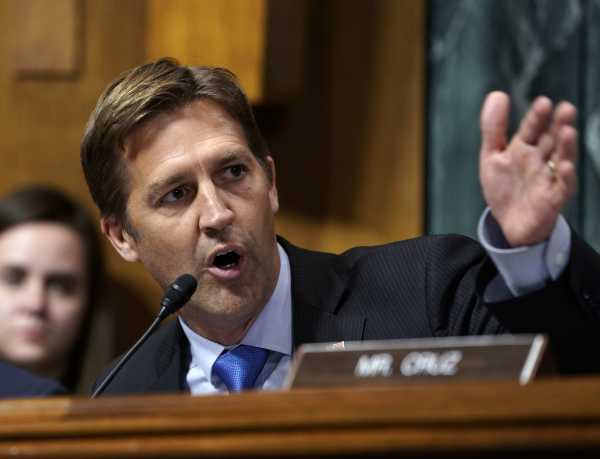
The Senate is scheduled to vote Monday on a bill that would put in place requirements for the care of infants born after failed abortions — and could send doctors to prison if they failed to comply.
The Born-Alive Abortion Survivors Protection Act, sponsored by Sen. Ben Sasse (R-NE), is almost certain to fail. But it’s part of a bigger debate about abortions very late in pregnancy that could intensify in the run-up to the 2020 election.
Sasse says the legislation is necessary to protect newborn babies — “it’s cowardly for a politician to say they’ll fight for the little guy but only if the little guy isn’t an actual seven-pound baby who’s fighting for life,” he said in a statement earlier this month. The senator has not responded to Vox’s request for comment.
But reproductive rights and physicians’ groups say the bill could criminalize doctors and is unnecessary since laws already exist to protect an infant in the extremely unlikely scenario of a birth after an abortion attempt. “The bill maligns and vilifies providers and patients to push a false narrative about abortion later in pregnancy,” Dr. Kristyn Brandi, a board member of Physicians for Reproductive Health, told Vox in an email.
By putting up the bill, Sasse and Senate Majority Leader Mitch McConnell are focusing attention on an aspect of the abortion debate they may see as a wedge issue for some voters: abortions very late in pregnancy.
The issue came to the fore earlier this year when Virginia Delegate Kathy Tran said in a committee hearing that a bill she was sponsoring would technically allow abortion when a woman was showing signs of labor. She later said she had misspoken, but video of the hearing went viral, and the controversy grew when Virginia Gov. Ralph Northam made confusing comments in support of the bill that some took as an endorsement of infanticide. President Donald Trump mentioned the controversy in his State of the Union speech, calling for tighter federal restrictions on abortion.
While Trump did not make abortion a top issue on the campaign trail in 2016, he did claim that Hillary Clinton was “saying in the ninth month you can take the baby and rip the baby out of the womb of the mother.” Now, inspired in part by the Virginia bill, Trump and other Republicans are bringing back the issue of very late abortions, perhaps in the hope of energizing their base in advance of 2020.
The Born-Alive Abortion Survivors Protection Act is coming up now in part because of controversy over a Virginia abortion bill
The Born-Alive Abortion Survivors Protection Act requires doctors to provide the same care for a baby born alive after a failed attempt at abortion as they would for any child of the same gestational age. After providing appropriate care, they are required to ensure that the baby “is immediately transported and admitted to a hospital.”
Doctors who fail to comply with the requirements would face a fine and up to 5 years in prison.
Sasse had previously introduced the bill in 2017, but it did not make it out of committee. Marsha Blackburn, then a House member, sponsored a similar bill in 2017, which passed the House but not the Senate.
In a speech introducing this year’s bill, Sasse specifically referenced Northam’s comments about the Virginia abortion bill, which would have expanded the circumstances under which someone could get an abortion in the third trimester.
Asked to explain Tran’s comments about the possibility of abortions during labor, Northam said, “If a mother is in labor, I can tell you exactly what would happen. The infant would be delivered. The infant would be kept comfortable. The infant would be resuscitated if that’s what the mother and the family desired, and then a discussion would ensue between the physicians and the mother.”
A spokesperson for Northam told Vox that the governor was “absolutely not” referring to infanticide, but that “the governor’s comments focused on the tragic and extremely rare case in which a woman with a nonviable pregnancy or severe fetal abnormalities went into labor.”
Related
The controversy around Virginia’s new abortion bill, explained
But Sasse said in a speech to the Senate on February 4 that Northam had “endorsed infanticide.” The governor “tarnished the American idea of equality under law, he betrayed the universal truth of human dignity, and he turned the stomachs of civilized people not just in this country but in every country on earth,” Sasse said.
“The Born-Alive Abortion Survivors Protection Act prohibits exactly the kind of infanticide that Gov. Northam was endorsing,” he added. “That’s what the legislation is about.”
Senate Democrats, reproductive rights groups, and groups representing doctors disagree, calling the legislation unnecessary and potentially damaging. “This legislation is based on lies and a misinformation campaign, aimed at shaming women and criminalizing doctors for a practice that doesn’t exist in medicine or reality,” said Dr. Leana Wen, president of Planned Parenthood Federation of America, in a statement to Vox.
Brandi, of Physicians for Reproductive Health, said she had never heard of a case of a child born after a failed abortion attempt. “This is a part of the false narrative around this bill and abortion later in pregnancy,” she said.
Even if a child were to be born after an abortion attempt, she said, laws already exist to protect the baby. In 2002, Congress passed the Born-Alive Infants Protection Act, which guaranteed to infants born at any stage of development full legal rights. That bill, which passed with bipartisan support, did not include criminal penalties for doctors and did not impose specific requirements on medical care.
Sasse’s bill, Brandi said, “is a stark departure from the 2002 law as it singles out abortion and applies strict new requirements on abortion providers only, with the intent to malign and threaten abortion providers.”
Brandi and others are concerned that the threat of fines and imprisonment could hamper providers’ ability to practice. Some critics of the bill believe its language — especially the requirement that doctors “exercise the same degree of professional skill, care, and diligence” in caring for a child born after a failed abortion as they would in caring for any other child — is so vague that it could leave doctors vulnerable to lawsuits.
Sen. Patty Murray (D-WA) called the bill “anti-doctor, anti-woman, and anti-family,” in remarks released to media, and said that “its proponents claim it would make something illegal that is already illegal.”
When the earlier version of the bill was proposed in 2017, the head of the American College of Obstetricians and Gynecologists called it a “gross legislative interference into the practice of medicine, putting politicians between women and their trusted doctors,” according to Rewire News.
Abortion opponents, meanwhile, have praised the bill. “If Democrats are truly against infanticide, every single Democratic senator should support this bill,” said Marjorie Dannenfelser, president of the anti-abortion group Susan B. Anthony List, in a statement.
The bill may be part of a larger strategy
Earlier this month, Majority Leader McConnell announced that a vote on the bill, which he is co-sponsoring, would be held Monday. The measure, which requires 60 votes to pass, has little chance of success in the closely divided Senate, but McConnell may be bringing it to a vote in part to get Democrats on record opposing it.
“The American people deserve to know whether their senators stand with vulnerable children struggling for life,” McConnell wrote in a recent op-ed in the Courier-Journal, a Kentucky newspaper.
“Are we really supposed to think that it’s normal that there are now two sides debating whether newborn, living babies deserve medical attention?” McConnell asked in a speech to the Senate on Monday afternoon. “I would urge my colleagues to listen to the voices of the American people.”
The bill may also be part of a larger strategy by Republicans of focusing on very late abortions in order to drum up support among social conservatives. Trump referenced the issue in his State of the Union speech, saying, “we had the case of the governor of Virginia where he basically stated he would execute a baby after birth.”
He brought it up again a few weeks later at a rally in El Paso, Texas, saying that Northam “stated that he would even allow a newborn baby to come out into the world, and wrap the baby, and make the baby comfortable, and then talk to the mother and talk to the father and then execute the baby.”
Trump and other Republicans may see abortions late in pregnancy as a wedge issue. A majority of Americans think abortion should be legal in all or most cases, but some polls have found that abortions later in pregnancy are more controversial. In a 2018 Gallup poll, just 13 percent of Americans said abortion should be generally legal in the third trimester.
Abortions in the third trimester are very rare — just 1.4 percent of all abortions take place at 21 weeks or beyond, according to Planned Parenthood. The situation described in the Virginia committee hearing simply doesn’t come up, Brandi said — “patients do not request abortion when they are in labor and doctors do not provide it.” But Northam’s comments gave Trump and other Republicans an opening to draw attention to very late abortion procedures with emotionally charged language about babies being executed.
Part of their goal may be to invigorate social conservatives, a reliably Republican voting bloc. Republicans lost ground in Congress in 2018, and Trump’s approval ratings are at historic lows. But he has delivered for abortion opponents by appointing conservative Justices Neil Gorsuch and Brett Kavanaugh to the Supreme Court, as well as many conservatives to lower federal courts. With a potential challenge to Roe v. Wade on the horizon, Republicans may see a benefit to reminding voters of their party’s anti-abortion bona fides, even if their efforts don’t change any laws in the short term.
Sourse: vox.com






